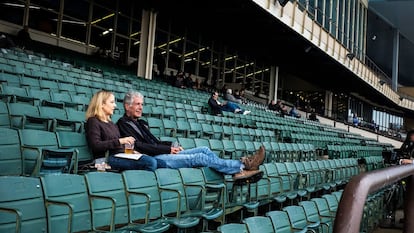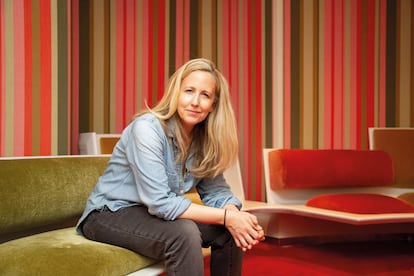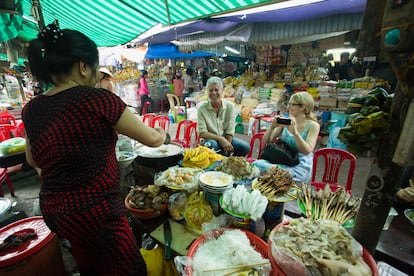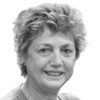Laurie Woolever: ‘After his death, dozens of people wanted to be the next Anthony Bourdain’
As the celebrity chef’s lieutenant for nearly a decade, Woolever was uniquely positioned to see the real personality behind the brash public persona of the man who revolutionized the food world with his books and TV shows

Bourdain: The Definitive Oral Biography is a kaleidoscopic vision of the famed New York chef, traveler and communicator Anthony Bourdain, served up by food writer Laurie Woolever, who was his top aide for nearly a decade. The book, which came out in 2021 and has now also been released in Spanish, is like a tasting menu made up of nearly 100 interviews with friends and relatives of the author of the seminal memoir Kitchen Confidential. This is Woolever’s second book after the chef’s death in June 2018.
Bourdain committed suicide at the age of 61 during the filming in France of the television program Anthony Bourdain: Parts Unknown, a fact that added to his aura of cursed poet. As Woolever’s biography shows, the man who looked like such a winner was in reality a suffering soul. In a Zoom conversation from New York, she said that to this day, she misses being able to talk about things with the man who was her boss but also her friend: “I miss him every day.”
Question. So Bourdain wasn’t actually the tough guy who made acidic comments about restaurants?
Answer. No. When you read Kitchen Confidential you see a side of him that’s very brash, which he had, but which I think was also a fantasy, a projection, a bit of an act, kind of like ‘this is the pirate I wanted to be as a boy, or the cowboy.’ In real life, I was surprised when I first met him that he was very soft-spoken, very gentle, shy, a little awkward. He was not a pirate in his daily life, but much more kind and empathetic than his writing might lead one to believe. He was unique.
Q. And did he have a dark side?
A. He made many people happy, but he also hurt them with his bad decisions.
Q. You say in the foreword to your book that you did not intend to write a book full of praise, and that by interviewing so many people with ties to Bourdain, you learned about more aspects of his personality. What can readers find out about Bourdain that they don’t already know?
A. People will see a complexity there, a portrait of the complete man who had deep insecurities, deep sadness. Of course, when a person takes their own life, there is some sadness implied, but I think people will see there was a more complicated relationship with addiction than most people think. His addiction to heroin as a young man is well known. He stopped and the understanding for many people was, well, he is no longer an addict and he no longer struggled with addictions. But the truth when you read it in the book is much more complex. Another aspect of his personality that you will discover is his very romantic sense of love; for the search for a true love he was capable of sacrificing anything. And they will also see his deep obsession with getting everything right with his television shows and his writing. He was a man who did not practice moderation in anything, starting from a very young age, 12 or 13. His childhood friends confirmed it to me. There are also interesting details about the relationship with his mother and brother Christopher and his father, things that he glossed over in life. He had a complicated relationship with his mother, who died in 2020, but I had a chance to talk to her in 2018.

Q. What does the family think of this biography?
A. The fact that his ex-wives, Nancy and Ottavia, and his daughter Ariane, were all willing to to participate in the book was huge for me, it conferred a lot of respect and also responsibility on me to tell their story accurately and strike a balance between asking difficult questions in some cases and maintaining a level of respect. It has been very emotional talking to all of them. We have to bear in mind that when he died he left behind a daughter who was 11 years old at the time. Anything that is said in the book is for her to live with, it’s the record of her father. It was key for me to get her point of view; she is a very smart child, and she was given the last word in the book, which I think was necessary and important. I hope Ariane sees how much she was loved and what a strong impact he had on the world.
Q. And how do you think today’s foodies and young chefs should view him?
R. He was an important marker in time. Kitchen Confidential was written in the late 1990s, and it was a reflection of the 1970s, 1980s and 1990s in America and of that time in kitchen culture. There are universal truths and ideas that transcend the decades and what it is to be a professional cook. But it’s also important to realize that he was writing about a time and a place that we have moved on from. And he was himself very willing to say that some of this was very bad behavior and cocaine fueled a lot of creativity and long working hours, but it didn’t work out well for him. What a young person reading Tony’s book should take away is his passion and love of the people at all levels — owners, fellow cooks, suppliers, fishermen, butchers. He had this ability to find the humor in this business, which is so difficult. And that he was able to admit his mistakes and find that there is always something to learn. Both in his writing and in his television career, he constantly showed his interest in being proven wrong and learning something new. He learned everything about the world in his post-chef career. By meeting people in all kinds of circumstances and hardships, he was able to add to his understanding of the world, and that is an important lesson for young people: the more you travel, the more you talk to people and listen, the more you learn.
Q. Would you agree that his culinary and cultural television programs, such as Anthony Bourdain: No Reservations or Anthony Bourdain: Parts Unknown were revolutionary? His style has been copied often.
A. Yes. For the book I spoke with a number of television executives, directors and other people in the business, who said that in the years after Tony’s death, dozens if not hundreds of people would come up to them and say ‘I want to be the next Anthony Bourdain.’ but they always got the same answer : ‘There was only one Anthony Bourdain.’ He created a new style of travel and food television where it wasn’t about shock value or even the cooking skills. It was about the people who prepare and serve the food every day,
Q. Are you proud to have worked with Bourdain for so long?
A. Absolutely. He wasn’t perfect, but he was very good and generous and fair. His interest in always telling the truth regardless of the personal consequences it entailed is an ethic that I always tried to live by. And also his commitment to his vision. There is a section in the book where TV executives explain how he refused to dumb down the show or to get bogged down with marketing concerns or what might attract the most viewers. It’s a framework I have tried to uphold in my own work.

Q. In the testimonies by Bourdain’s acquaintances collected in the biography, his last partner, Asia Argento, does not come out looking very good. Why wasn’t her voice included in the book?
A. It was ultimately an editorial decision not to include her. She had written her own autobiography that came out around the same time, and as a public person she gave many interviews on the subject, and I felt she would not contribute anything that she had not already said in her own words.
Q. This book, published in the United States in 2021, is the complement to World Travel: An Irreverent Guide, which collected memories of your travels with Bourdain, and included opinions from friends and colleagues. After these two posthumous books, is there more material left for another one?
A. These are the last two books I will do focused on the figure of Anthony Bourdain. I’ve already said everything I wanted to say. I am now working on my own memoir, in which he obviously appears, because he was very much a part of my professional life for a long time. But it is my own perspective on what it has been like to work in this fascinating world of food since I graduated from college, and what it is like to be a woman in the industry.
Q. It feels like things have changed a lot in the industry in the past couple of decades. Besides your writing, you also co-host a food-focused podcast, Carbface for Radio. Is it getting harder to make a living as a food writer in today’s world of endless online resources?
A. Things have changed a lot since I graduated from college. At first it felt there were a lot of possibilities, then suddenly the internet took over the food writing world, magazines closed, and cookbooks have become, if not obsolete, a little bit old-fashioned, because now you can find photos and videos instantly online. That’s been a difficult thing to recognize and to work with. It’s a fascinating, difficult and heartbreaking time to be in this business. But I’m optimistic, because people still love to hear about and talk about food. Platforms are constantly evolving and you just have to keep raising interesting issues and trust that there will be an audience for it.
Sign up for our weekly newsletter to get more English-language news coverage from EL PAÍS USA Edition
Tu suscripción se está usando en otro dispositivo
¿Quieres añadir otro usuario a tu suscripción?
Si continúas leyendo en este dispositivo, no se podrá leer en el otro.
FlechaTu suscripción se está usando en otro dispositivo y solo puedes acceder a EL PAÍS desde un dispositivo a la vez.
Si quieres compartir tu cuenta, cambia tu suscripción a la modalidad Premium, así podrás añadir otro usuario. Cada uno accederá con su propia cuenta de email, lo que os permitirá personalizar vuestra experiencia en EL PAÍS.
¿Tienes una suscripción de empresa? Accede aquí para contratar más cuentas.
En el caso de no saber quién está usando tu cuenta, te recomendamos cambiar tu contraseña aquí.
Si decides continuar compartiendo tu cuenta, este mensaje se mostrará en tu dispositivo y en el de la otra persona que está usando tu cuenta de forma indefinida, afectando a tu experiencia de lectura. Puedes consultar aquí los términos y condiciones de la suscripción digital.









































